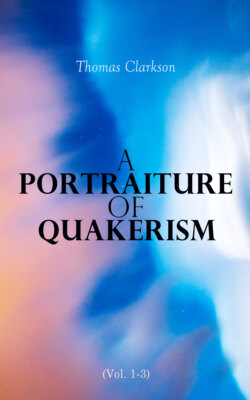Читать книгу A Portraiture of Quakerism (Vol. 1-3) - Thomas Clarkson - Страница 10
На сайте Литреса книга снята с продажи.
SECT. II.
ОглавлениеThe first argument for the prohibition of cards, and of similar amusements, by the Quakers, is—that they are below the dignity of the intellect of man, and of his moral and christian character—sentiments of Addison on this subject.
The reasons, which the Quakers give for the prohibition of cards, and of amusements of a similar nature, to the members of their own society, are generally such as are given by other Christians, though they make use of one, which is peculiar to themselves.
It has been often observed, that the word amusement is proper to characterize the employments of children, but that the word utility is the only one proper to characterize the employment of men.
The first argument of the Quakers, on this subject, is of a complexion, similar to that of the observation just mentioned. For when they consider man, as a reasonable being, they are of opinion, that his occupations should be rational. And when they consider him as making a profession of the Christian religion, they expect that his conduct should be manly, serious, and dignified. But all such amusements, as those in question, if resorted to for the filling up of his vacant hours, they conceive to be unworthy of his intellect, and to be below the dignity of his Christian character.
They believe also, when they consider man as a moral being, that it is his duty, as it is unquestionably his interest, to aim at the improvement of his moral character. Now one of the foundations, on which this improvement must be raised, is knowledge. But knowledge is only slowly acquired. And human life, or the time for the acquisition of it, is but short. It does not appear, therefore, in the judgment of the Quakers, that a person can have much time for amusements of this sort, if he be bent upon obtaining that object, which will be most conducive to his true happiness, or to the end of his existence here.
Upon this first argument of the Quakers I shall only observe, lest it should be thought singular, that sentiments of a similar import are to be found in authors, of a different religious denomination, and of acknowledged judgment and merit. Addison, in one of his excellent chapters on the proper employment of life, has the following observation: "The next method, says he, that I would propose to fill up our time should be innocent and useful diversions. I must confess I think it is below reasonable creatures, to be altogether conversant in such diversions, as are merely innocent, and have nothing else to recommend them, but that there is no hurt in them. Whether any kind of gaming has even thus much to say for itself I shall not determine: but I think it is very wonderful to see persons of the best sense passing a dozen hours together in shuffling and dividing a pack of cards, with no other conversation, but what is made up of a few game-phrases, and no other ideas, but those of red or black spots ranged together in different figures. Would not a man laugh to hear any one of this species complaining that life is short?"
